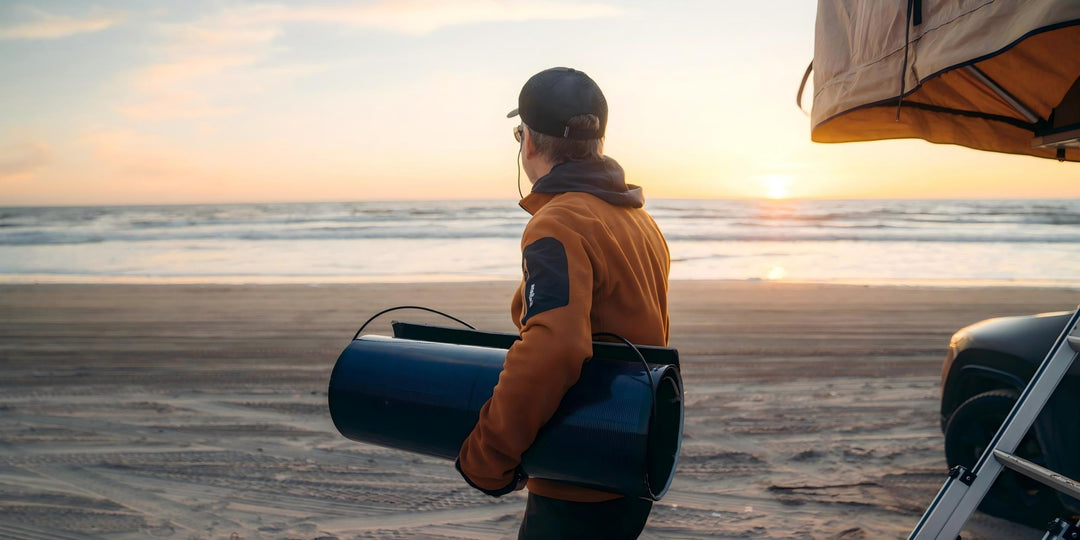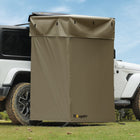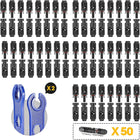How Much Do Solar Panels Weigh?

If you’re considering adding solar panels to your RV, camper, or tiny house, you’ve probably wondered: how much do solar panels weigh? Understanding solar panel weight is essential, particularly if you’re planning to install them on your roof, transport them during camping trips, or stay within the weight limits of your vehicle or tiny home. In this blog post, we’ll break it all down for you—how much solar panels typically weigh, why they can seem so heavy, and the lightweight options available for adventurers like you.
How Much Do Solar Panels Typically Weigh?
The weight of a solar panel depends on its size, type, and construction. Let’s start with the basics: standard residential solar panels (the kind you see on rooftops of houses) typically weigh between 30 and 50 pounds (13 to 23 kg) per panel. These panels are usually around 65 inches by 39 inches (1.65 m by 1 m) in size and are designed to be durable and long-lasting.
However, if you’re a camper, RV owner, or tiny house enthusiast, you’re likely looking at smaller, more portable options. Here’s a quick breakdown of common solar panel types and their approximate solar panel weight ranges:
Portable Solar Panels: These are designed for easy transport and typically weigh between 1.7 and 4.5 pounds (0.7 and 2.1 kg) per panel, depending on their size and wattage.
CIGS Flexible Solar Panels: Lightweight and ultra-thin, these panels weigh between 4 and 8 pounds (2 to 3.6 kg) per panel.
Why Are Solar Panels So Heavy?

If you’ve ever picked up a glass-covered solar panel, you might have been surprised by its weight. So, why are solar panels so heavy? Here are the main reasons:
1. Durable Materials
Most traditional solar panels are made with tempered glass, which protects the solar cells from weather, debris, and other environmental factors. While tempered glass is strong, it’s also one of the heaviest components of a solar panel.
2. Aluminum Frames
To support the glass and solar cells, panels are built with aluminum frames. Although aluminum is lighter than many other metals, when combined with glass and other components, it contributes to the overall weight of the solar panel.
3. Efficiency and Size
The more power a solar panel produces, the larger it usually is. This means more materials are required, which increases the weight. For example, a 100W panel will generally weigh less than a 300W panel because it’s smaller.
4. Durability for Long-Term Use
Solar panels are designed to last for more than 20 years, even in harsh conditions. This means they’re built to withstand wind, rain, snow, and even hail, which requires sturdy materials that naturally add weight.
Lightweight Solar Panel Options for Adventurers
If you’re looking for solar panels for your RV, camper, or tiny house, you might not want something as heavy as a traditional residential panel. Fortunately, there are lightweight and portable options that are perfect for your needs. Let’s explore two great choices: portable solar panels and CIGS flexible solar panels.
1. BougeRV 100W Fiberglass Foldable Solar Panel: Lightweight and Portable Power

The BougeRV 100W Fiberglass Foldable Solar Panel is designed for adventurers who value portability and efficiency. Its foldable design makes it incredibly easy to transport and store, while the durable fiberglass construction ensures long-lasting performance even in tough outdoor conditions. Equipped with built-in stands, this panel allows for optimal sun positioning, making it perfect for on-the-go energy needs.
-
Weight: Weighing just 4.41 lbs (2.0 kg), this panel strikes the perfect balance between lightweight design and reliable power output.
-
Why It’s Great: Compact, lightweight, and easy to set up, this foldable solar panel is ideal for camping trips, RV adventures, or any off-grid scenario. The built-in kickstands enhance efficiency by allowing you to angle it directly toward the sun.
-
Perfect For: Campers, RV owners, and outdoor enthusiasts looking for a portable, space-saving solar solution without compromising on performance.
Learn more about the BougeRV 100W Fiberglass Foldable Solar Panel here.
2. BougeRV 200W CIGS Flexible Solar Panel: Sleek and Versatile Energy Solution

The BougeRV 200W CIGS Flexible Solar Panel is a game-changer for those seeking a lightweight, adaptable, and powerful solar solution. Built with advanced CIGS technology, this panel is ultra-thin, flexible, and incredibly durable. It can even be bent and adjusted to fit curved surfaces without cracking, making it ideal for curved or uneven surfaces like RV roofs, boats, or tiny homes. Its adhesive backing simplifies installation, eliminating the need for bulky mounting hardware.
-
Weight: At just 8.44 lbs (3.8 kg), this panel is one of the lightest 200W options available, offering exceptional portability and ease of use.
-
Why It’s Great: Its flexible and ultra-thin design allows for seamless installation on curved surfaces, while its lightweight build ensures minimal impact on your vehicle or structure. Despite its sleek profile, it delivers impressive power output, making it a reliable choice for off-grid living.
-
Perfect For: RV and camper owners, boaters, and tiny house enthusiasts seeking a lightweight, low-profile, and highly efficient solar panel for their off-grid energy needs.
Learn more about the BougeRV 200W CIGS Flexible Solar Panel here.
How to Choose the Right Solar Panel for Your Needs
When deciding which type of solar panel is best for your RV, camper, or tiny house, consider the following factors:
1. Weight Limits
If you’re adding solar panels to your RV, make sure to check the weight capacity. Portable or CIGS flexible panels are excellent choices if you’re concerned about adding too much solar panel weight.
2. Portability
Do you plan to move your solar panels around frequently? If so, portable panels are a great option because they’re easy to carry and set up.
3. Installation Surface
If your roof is curved or uneven, CIGS flexible solar panels are the ideal solution. Their ability to bend and conform to surfaces makes them perfect for tricky installations.
4. Power Needs
Think about how much power you’ll need to generate. Larger panels produce more power but weigh more, so find a balance that works for your energy needs and solar panel weight limits.
Final Thoughts
Whether you’re a weekend camper, a full-time RVer, or a tiny house dweller, there’s a solar panel option out there for you. While traditional solar panels can be heavy, modern advancements have made it possible to enjoy lightweight, portable, and efficient options.
At BougeRV, we’re proud to offer a range of solar panels designed with adventurers in mind. From our portable solar panels that are perfect for camping trips to our CIGS flexible solar panels that fit seamlessly on RV roofs, we’ve got you covered.
So, whether you’re hitting the open road or building your dream tiny house, you can harness the power of the sun without worrying about heavy, bulky panels. Lightweight, portable, and efficient—what’s not to love?
FAQs
1. Can my RV or camper roof handle the weight of solar panels?
Yes, most RV and camper roofs are designed to handle the weight of lightweight solar panels, such as flexible panels (4–8 pounds per panel). However, it’s always a good idea to check your RV or camper’s roof weight capacity in the user manual or consult the manufacturer to ensure safety. If you’re concerned about weight, flexible or foldable panels are excellent lightweight options.
2. Do lighter solar panels compromise on performance?
Not necessarily! Lightweight options such as portable and CIGS flexible solar panels are designed to be efficient and portable without sacrificing performance. While they may have slightly lower durability compared to rigid glass-covered panels, they are more than capable of meeting the energy needs of campers, RV owners, and tiny house dwellers. Always check the wattage and efficiency rating when choosing a panel to ensure it meets your power requirements.
3. Are foldable and flexible solar panels easy to install?
Absolutely! Foldable solar panels require no installation—just unfold them, place them in direct sunlight, and connect them to your power system. Flexible solar panels, on the other hand, are designed for easy installation on curved or flat surfaces. They can be attached using adhesive, screws, or mounting brackets, depending on your preference. Both options are beginner-friendly and perfect for DIY enthusiasts.






















































































































































































































